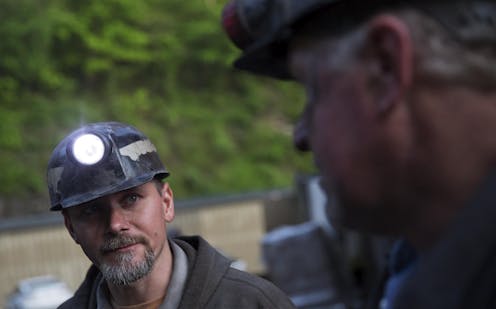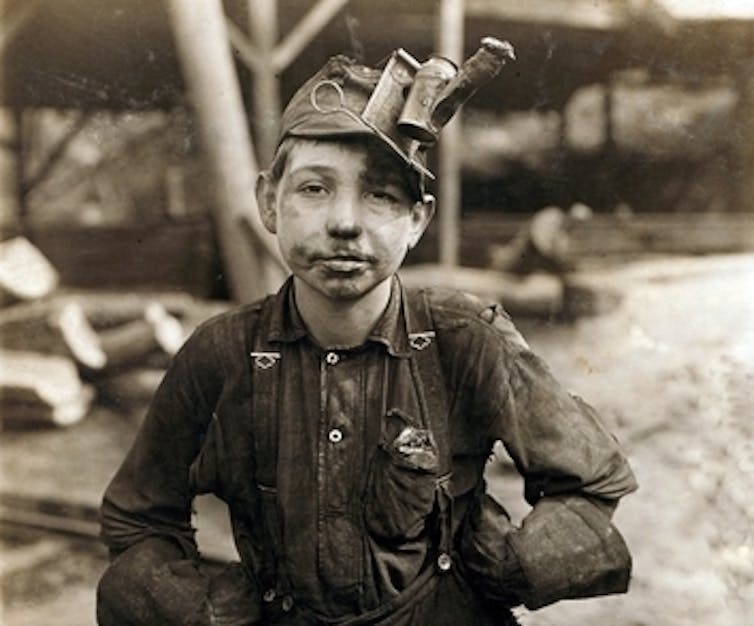The struggle for coal miners’ health care and pension benefits continues
As coal companies look for ways to cut costs, many are reneging on their promises for health care for retired miners. Unless Congress intervenes, these miners could face ill health and poverty.

Coal mining continues to be one of the most hazardous professions in our society. Even today, while the number of large-scale mining disasters and the number of deaths have certainly declined, coal miners continue to face a work environment that is inherently toxic and unhealthy. Coal miners who survive the mines walk away from their profession with significant health impairments and shorter life expectancies than most other Americans.
Yet for centuries, miners have braved dangers for the promise of better lives for their families. And since 1946 they have been supported by a compact between miners, owners and the federal government, that made health care and pensions an integral part of the profession in this country.
However, structural changes in the U.S. economy have strained, if not unraveled, this compact. And mine owners have consistently sought to shed their obligations towards miners and their families. Most recently, a judge allowed the bankrupt Westmoreland Coal Company to abandon its promise of paying for the health care of retired union workers as well as its union contracts. The company announced March 4, 2019 that a bankruptcy court has approved the sale of many of its assets to creditors and that business will “continue operating in the normal course.”
Except that it won’t for coal miners, of course, who will lose many of their benefits even as creditors at least get some of the company’s assets. And Westmoreland is hardly the only mining company eagerly reneging on its decades-old promises.
Coal miners have literally provided the fuel for the unprecedented industrialization of this country. Living in West Virginia and having written about the plight of coal workers’ health care as a public policy scholar, I believe the way forward involves the nation honoring its commitment to past and current miners. Yet, it also involves an honest acknowledgment that nation’s energy mix of the future will likely feature a diminished role for coal.
The changing fortunes of the coal industry

At the heart of the current situation is an agreement between the federal government and the United Coal Miners of America dating from 1946. Faced with a series of strikes across different industries after World War II, President Truman, in line with a long line of federal interventions in the coal industry, took control over the nation’s coal mines in order to keep them operating. The conflict was ultimately settled by the Krug-Lewis Agreement of 1946 which, among other things, established health care and pension funds for union miners.
For several decades, with a large number of union miners contributing, the health care and pension trust funds were sufficiently funded in general. However, over time both trust funds started to incur structural deficits for a variety of reasons.
For one, employment in the coal industry has been shrinking steadily over the past few decades, from more than 850,000 in the 1920s to just over 50,000 today. Employment reductions have been driven by efficiency gains, mechanization, a shift toward surface mining, and lower demand.
Moreover, of those miners remaining, a vast majority are not union members. As a result, there are only a few thousand union coal miners left to pay into these funds, while roughly 12 times as many are currently drawing health care and pension benefits.
The Great Recession aggravated the situation. Faced with mounting obligation and declining markets, some of the nation’s largest coal companies declared bankruptcy. This allowed them to shed their obligations to their former employees. The situation has shown few signs of abatement under the Trump administration.
As result, both health care and pension benefits are no longer financially sustainable, potentially affecting more than 100,000 retired miners and their families.
Was there or was there not a federal guarantee?
There is a debate about the nature of the original compact from 1946. The issue centers around the question whether the federal government made a permanent commitment to coal miners and their families. This is the position of coal miners and the United Mine Workers of America. Ultimately, this would entail the federal government serving as a payer of last resort should coal companies and unions be unable to sustain their financial commitment.
Others, like the conservative think tank The Heritage Foundation, have argued that the intervention by the federal government was merely temporary. Moreover, they argue that the UMWA has repeatedly violated the agreement and pushed for changes that accelerated the current funding crisis.
Unquestionably, the issue is complex. However, to my eye the evidence seems to favor the former interpretation, as the agreement was repeatedly reaffirmed by the federal government. This occurred most prominently through the legislation in 1996 and 2006.
As the Dole Commission, appointed under President Bush in 1989 to evaluate coal miners’ benefits, put it: “The UMWA Health and Retirement Funds is as much a creature of government as it is of collective bargaining … In a way, the original Krug-Lewis agreement predisposed, if not predetermined, the system that evolved.”
American Miners Act of 2019
The structural imbalances of the UMWA trust funds described above have inevitably led to a number of periodic crises in which pension and health care benefits for miners came under immediate threat of running out. So far, Congress has been able to patch together mostly temporary solutions without comprehensively addressing the problems in their entirety.
Earlier this year, Sen. Joe Manchin, a Democrat from West Virginia, introduced the American Miners Act of 2019 to shore up pension and health care benefits. The act as introduced also seeks to preserve the Black Lung Disability Trust Fund, providing medical and pension benefits to miners suffering from pneumoconiosis. This fund is also teetering on financial insolvency if scheduled cuts to the federal excise tax on coal are implemented.
If Congress fails to act, trust funds will ultimately run out of funds, with dire benefits for miners and their families. For one, miners would lose their small pensions, which currently only average US$560 per month. Miners would also need to seek alternative sources of health coverage, or go without. Government would then be on the hook for tens of millions of dollars for those miners qualifying for Medicaid, Medicare or ACA marketplace coverage. Equally crucial, the demise of the historically underfunded Black Lung Disability Trust Fund paying for pensions and medical expenses would be devastating.
Moving forward

After the most recent midterm elections, a group of Democratic lawmakers in Washington, D.C., has begun to push energetically for a Green New Deal. While details remain unclear, it is based on a turn away from fossil fuel energy. Unquestionably, we should acknowledge the significant externalities inherent in coal mining and coal-based power production. These affect not only miners but their entire communities and society at large through water and air pollution as well as global climate change.
Given the vast negative effects of coal, it seems prudent to transition to healthier sources of energy production. Yet in this process, we should not forget about coal miners and their families who have brought us to where we are today. The bipartisan support for the American Miners Act of 2019 and similar bills in the past in the often-polarized U.S. Congress is indicative of this recognition. Republican leadership in Congress should end their opposition to a permanent fix.
I believe that any program moving the nation toward greener energy sources must include a lasting solution for coal miners, their families and their communities. This includes both guaranteeing long-term funding for pension, health care and medical programs as well as transitional programs to help them adapt to an economy with a smaller role for coal mining.
Simon F. Haeder is a Fellow in the Interdisciplinary Research Leaders Program, a national leadership development program supported by the Robert Wood Johnson Foundation to equip teams of researchers and community partners in applying research to solve real community problems.
Read These Next
The tragedy of sudden unexpected infant deaths – and how bedsharing, maternal smoking and stomach sl
Rates of sudden unexpected infant deaths have not gone down significantly over the last 20 years, and…
3 things to learn about patience − and impatience − from al-Ghazali, a medieval Islamic scholar
In religious traditions, patience is more than waiting, or even more than enduring a hardship. But what…
5 years after the Mueller report into Russian meddling in the 2016 US election on behalf of Trump: 4
What Trump knew about alleged Russian meddling in the 2016 presidential election remains an open question…




